
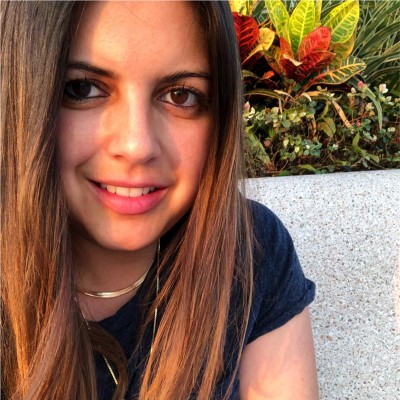 Welcome to the Sciessent Tex Talk Podcast, where we chat with the movers and shakers of the textile world to bring you behind the scenes insights you can use to kickstart your career into high gear.
Welcome to the Sciessent Tex Talk Podcast, where we chat with the movers and shakers of the textile world to bring you behind the scenes insights you can use to kickstart your career into high gear.
Today we are speaking with Levana Bienstock, the Manager of Raw Materials at Victoria’s Secret.
Levana is a textile specialist, with over a decade of experience in the fashion industry.
Originally from the Midwest, she moved to New York to study at Pratt Institute, where she graduated with her BFA in Fashion Design. While at Pratt, Levana initiated the fashion department’s exchange program, spending a year at Nouva Accademia di Belle Arti in Milan, Italy.
Over the course of her career, Levana has held roles on the fabric teams at Lord & Taylor Private Label, DKNY Ready to Wear, and Anna Sui. She partnered directly with Anna Sui on researching fabrics and prints for the designer’s Runway Collections.
Levana joined Victoria’s Secret in 2015. She has been able to merge her passion of lace, embroidery, and fabric development with her technical expertise, working hand in hand with the lingerie industry’s top suppliers and vendors.
In her free time, you can find Levana walking her pug puppy in Central Park! Thank you so much for joining us today, Levana! How are you doing?
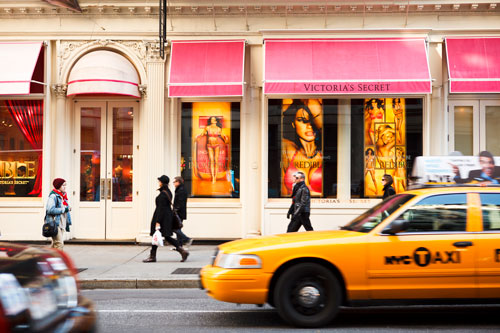
Levana Bienstock: Hi, Steve. I’m good. How are you?
Steve Cunningham: I’m doing great, thank you. I think the question that everyone wants to know right off the bat is what’s the pug puppy’s name?
Levana Bienstock: His name is Fig.
Steve Cunningham: Fig. I love it.
Levana Bienstock: Fig like the fruit. When I first saw him, I didn’t have a name in mind so I kept calling him “Pug.” And I was like, “I can’t keep my dog’s name ‘Pug’.” So I was coming up with another one syllable word to get his attention. So “Fig.”
Steve Cunningham: It’s perfect. That’s great.
Could you tell us a little bit more about yourself and how you became the raw materials manager of Victoria’s Secret?
 Levana Bienstock: I grew up in Indianapolis and in my mind New York was the place to go if you wanted to get into the fashion industry. So I studied at Pratt Institute and my major was fashion design. But I think as early as my freshman year, textile was my favorite class. I just love learning about the dyeing process. Even before Project Runway came out on the mainstream, I just always felt like fabric was the start of it all. And if you find an exciting fabric, you could take the most basic silhouette and do something different with it. That always stuck with me. I had no idea that fabric was in itself a specific niche market in the industry. So, I finished my studies at Pratt thinking I would be a designer and I fell into this role and realized quickly that fabric is really an area of expertise.
Levana Bienstock: I grew up in Indianapolis and in my mind New York was the place to go if you wanted to get into the fashion industry. So I studied at Pratt Institute and my major was fashion design. But I think as early as my freshman year, textile was my favorite class. I just love learning about the dyeing process. Even before Project Runway came out on the mainstream, I just always felt like fabric was the start of it all. And if you find an exciting fabric, you could take the most basic silhouette and do something different with it. That always stuck with me. I had no idea that fabric was in itself a specific niche market in the industry. So, I finished my studies at Pratt thinking I would be a designer and I fell into this role and realized quickly that fabric is really an area of expertise.
Levana Bienstock: And I started out doing a little bit of everything, embellishment, color, and really the more I got involved, the more I realized how huge this world of textiles was. And I followed wherever one door closed, another one opened. And it’s been very exciting for me. I’ve always been on the research end of the process throughout my journey and going into Victoria’s Secret I was able to merge that into a more technical role. So it’s been not a one way path, but a little bit of a journey to get to this point. But I’ve really enjoyed it. And it’s been really cool to see just how much the textiles influence the entire design process.
Steve Cunningham: That’s really great. It’s cool to see that you thought your journey was going to go one way, as maybe a designer, and then you ended up on the fabric side. And is there anything you would’ve done differently? Or you think your journey was exactly what it was supposed to be?
 Levana Bienstock: No, everyone has to go through the struggles of the day in and day out. But nothing I would’ve done differently. I learned something from everywhere along the way. What’s important is just realizing that there’s so much to learn. Nobody knows everything. So what I’ve found really humbling is no matter what level you’re at in the industry, there’s always things to learn. And especially with textiles, there’s so much technology coming out and so many new and exciting innovations that there’s always another question to ask, there’s always another process to understand, there’s always another machine to learn about. So it’s really kept it very interesting. It makes everyone a bit curious. What is the next phase in fashion and how do I discover it? And the development process is fun because you go through these failures and you’re working with some of the best people in the world. And sometimes it is a trial to figure these things out.
Levana Bienstock: No, everyone has to go through the struggles of the day in and day out. But nothing I would’ve done differently. I learned something from everywhere along the way. What’s important is just realizing that there’s so much to learn. Nobody knows everything. So what I’ve found really humbling is no matter what level you’re at in the industry, there’s always things to learn. And especially with textiles, there’s so much technology coming out and so many new and exciting innovations that there’s always another question to ask, there’s always another process to understand, there’s always another machine to learn about. So it’s really kept it very interesting. It makes everyone a bit curious. What is the next phase in fashion and how do I discover it? And the development process is fun because you go through these failures and you’re working with some of the best people in the world. And sometimes it is a trial to figure these things out.
Levana Bienstock: One of the more exciting parts of the job that I personally love is going to the textile shows. Another thing is some of the vendors come up with ideas, they’ll show designers samples and they’ll say, “Hey, this is what we’ve researched. What do you think?” And a designer might say, “Oh, I love this idea. I don’t see it anywhere in the market yet.” Or designers can go shopping. We do a lot of shopping trips all over the world and maybe they’ll see something that they’re inspired by and say, “Hey, this looks exciting.”
Levana Bienstock: Maybe it’s not lingerie. Maybe it’s something we see in ready wear and we want to translate it into lingerie. So it’s sort of like this team effort where I don’t think there’s any one person taking it all on their shoulders. I think what’s really exciting is we all work together and I think what’s great is our suppliers are so innovative and so, I don’t know, just so open to share things. And one of the exciting things about being part of such a huge company is we’re usually among the first to find out about some of these ideas. It’s really cool to bring these things, to market and be on the forefront of that innovation.
Are there any other areas where consumer insight comes in prior to product development?
Steve Cunningham: You obviously have data based on what was successful before. But when you’re innovating and doing something different, where does a consumer come in there?
 Levana Bienstock: When we have a new product we’ll do a word vest. I think that’s pretty common across the industry before launching a big idea. Do people like it? Is it the right fabric? We take a lot of pride and comfort and technical expertise. I’ll wear things sometimes. I want to make sure that what we’re putting out there is the right thing and it’s important to everyone at the business to put out the best possible product for the customer. And part of that is the wearer experience. We take a lot of pride in that.
Levana Bienstock: When we have a new product we’ll do a word vest. I think that’s pretty common across the industry before launching a big idea. Do people like it? Is it the right fabric? We take a lot of pride and comfort and technical expertise. I’ll wear things sometimes. I want to make sure that what we’re putting out there is the right thing and it’s important to everyone at the business to put out the best possible product for the customer. And part of that is the wearer experience. We take a lot of pride in that.
What other brands do you work with today?
Levana Bienstock: At VS & Co., we kind of have a few different categories. I’m focused on the lingerie part of the business. And within lingerie there are even more categories. For the past five and a half years, I’ve been working on the glamor part of the lingerie area of the business. That’s been really cool for me just to meet with the lace suppliers, visit some of the embroidery suppliers overseas and really understand what it takes to get these beautiful things. It’s an amazing process. And right now I just did from the glamor part of the business to the casual part of the business, which is a whole other area of focus and it’s more of the everyday bras. The fabrications are different, the technology is different, the user experience is different. It’s been very eye opening to be able to see the different parts of the company and to focus on the raw materials for each area.
Athleisure as a category has really come along into the everyday multifunctional clothing. How have you seen that evolve in your time with Victoria’s Secret?
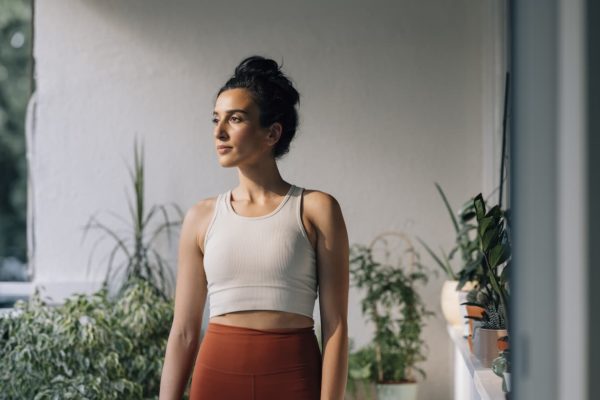 Levana Bienstock: Since we are a lingerie company, bras is always first. That’s what we focus on. And there is still a want for this casual loungewear product. I’ve seen over the years I’ve been at the company categories have come and gone and moved around. And it’s an exciting time because some of these categories are coming back into focus, especially with people spending more time at home so it’s nice to work in a company where there’s products for all facets of life and there’s kind of something for any time.
Levana Bienstock: Since we are a lingerie company, bras is always first. That’s what we focus on. And there is still a want for this casual loungewear product. I’ve seen over the years I’ve been at the company categories have come and gone and moved around. And it’s an exciting time because some of these categories are coming back into focus, especially with people spending more time at home so it’s nice to work in a company where there’s products for all facets of life and there’s kind of something for any time.
Steve Cunningham: And what about Mast? So Mast is a technical arm of Victoria’s Secret, correct?
What’s the role of Mast as it relates to your job and the operation as a whole?
Levana Bienstock: We’re all together under this VS & Co. And Mast was really always the execution part of the business. We have a team that does the very upfront development things. And then at a company as large as Victoria’s Secret, how do you make it scalable? How do you make it so the customer can enjoy it not one times, not two times, but 20 times? How do you make a product that stands through all these washes? How do you make a product that has good quality? Sometimes you find the most beautiful item and we love it, but it’s too expensive. So how do we reimagine it in a price point that our customers can buy? Really Mast is about the execution. You have something that you want to put into production. How do we make it production feasible? How do we take it from that development all the way through the production? How do we get it in stores and how do we make it something the customer can wear and enjoy and be happy with a product?
How did the pandemic impact the way you were working?
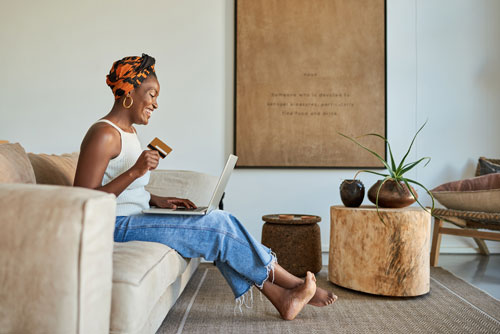 Levana Bienstock: It affected us a lot. When you think about textiles, it’s a tactile, you want to touch it, you want to feel it, you want to stretch it. Everyone wants to hold it. And especially when you’re thinking about lingerie, it’s so close to your body. You don’t want anything that’s scratchy you don’t want anything that doesn’t feel good. For us, one of the biggest challenges, and I’m sure most people across the industry felt this, was how do we meet with our suppliers who are abroad with travel limited? For us, we did have to shift a lot. We started doing a lot of virtual meetings instead of having person meetings, which in the beginning it was an adjustment, but it showed us all that we can do it. We can work this way. If we found something we really liked, we had it sent to someone on the fabric team, we had it sent to the designers so we were all looking at the same thing.
Levana Bienstock: It affected us a lot. When you think about textiles, it’s a tactile, you want to touch it, you want to feel it, you want to stretch it. Everyone wants to hold it. And especially when you’re thinking about lingerie, it’s so close to your body. You don’t want anything that’s scratchy you don’t want anything that doesn’t feel good. For us, one of the biggest challenges, and I’m sure most people across the industry felt this, was how do we meet with our suppliers who are abroad with travel limited? For us, we did have to shift a lot. We started doing a lot of virtual meetings instead of having person meetings, which in the beginning it was an adjustment, but it showed us all that we can do it. We can work this way. If we found something we really liked, we had it sent to someone on the fabric team, we had it sent to the designers so we were all looking at the same thing.
Levana Bienstock: But it also made us all a lot more conscious about how many swatches are we requesting? How much stuff do we really need? It was a different way of working. We started doing digital libraries, we started taking more advantage of a digital platform. Of course we’re all super excited for when we can meet again in person and touch things because there’s nothing that can really replace that. But we’ve managed pretty well. We’ve all learned how to share our screens, how to look at sketches together, how to work in this new platform. And we’re taking a lot away with us. And even in the future, it’s not the worst thing in the world to eliminate some of this wastage with paper and shipping. And it is doable to work in a digital platform. So that was one of the big adjustments for us during the pandemic. For sure.
Steve Cunningham: And I’m sure there’s a lot of people that can relate to that, myself included. Not nearly to the extent of you, we have fabrics that come in for testing in our labs. But for you guys, it’s a little different when you’re designing so I can certainly understand that I’m sure people listening will as well. To go back to your career, it spanned all the way from design to aesthetic to raw materials and some science. Could you compare and contrast the two roles for us and just what you liked, disliked and how you saw each role and where you see you fit best.
 Levana Bienstock: Sure. Fabric is always an emotional thing. I see something, I love it, it’s beautiful. Especially when I was working at Anna Sui, I would go on fabric appointments. I loved it. She loved it. It would go out on the runway. I didn’t have to do much else. But when you work for a mass market company that reaches so many people globally, you have to think a little bit differently. And I think differently about things, for sure. Not only does it have to be beautiful, but it has to, it has to go through the wear and the wash. Learning about the technical limitations of things, how things are really made, I had the wonderful opportunity working at VS I spent a month visiting our team in Hong Kong and somebody was on maternity leave and they asked me, “oh, do you want to work in Hong Kong office and see how things are there?”
Levana Bienstock: Sure. Fabric is always an emotional thing. I see something, I love it, it’s beautiful. Especially when I was working at Anna Sui, I would go on fabric appointments. I loved it. She loved it. It would go out on the runway. I didn’t have to do much else. But when you work for a mass market company that reaches so many people globally, you have to think a little bit differently. And I think differently about things, for sure. Not only does it have to be beautiful, but it has to, it has to go through the wear and the wash. Learning about the technical limitations of things, how things are really made, I had the wonderful opportunity working at VS I spent a month visiting our team in Hong Kong and somebody was on maternity leave and they asked me, “oh, do you want to work in Hong Kong office and see how things are there?”
Levana Bienstock: And I jumped at the chance because how often do we get to go to the other side of the world and really see the day in and day out of production? While I was there I did spend a lot of time in China visiting the factories. And seeing how these things are made it gives you a whole of different perspective. Before I would see a lace and say, “Oh, can that flower be a little bit smaller?” But when you go to the factory, you see, “Oh, that little adjustment, they have to redo the entire machine. They have to rethread all these small needles.” It makes you really think about this is a small ask, but it’s actually a big ask.
Levana Bienstock: Going to the factories and learning all these technical elements and really understanding why do things look a certain way? What are the yarn sizes? How do you get the effects you want? I think that definitely put things into perspective for me. It’s sort of like, how do you find something that’s beautiful and then scale it to a mass market and make it something that everyone can have. Really learning about how the fabrics are made, that really helped me.
Steve Cunningham: That’s such a great opportunity to be able to go over there and get the other side into the fabric production and in development. That’s got to be invaluable. We all have seen sustainability in fashion and how important it has become within the industry, but also most importantly at the consumer level over the years.
Can you tell us about your approach to innovation, sustainability and where you see the lingerie industry heading as it relates to that?
 Levana Bienstock: Sure. I think that we’ve discovered that people really care about this subject. It’s really important to people. People like to know where the garments are made. They like to know the whole story behind it. And as I go shopping, as people go shopping to the market, your curious. And we see more and more brands saying this is sustainably sourced material, this is really sharing the story behind the garments and the fabrics. And for us, it’s really about the big picture, not only the raw materials, not only the components, but the factory. How are they using energy? Where’s the water supply coming from? How do we create a sustainable environment in totality? Where are the fibers coming from? It’s not just necessarily one specific thing. It’s the whole circle coming together. It’s definitely a big initiative for VS, a big initiative in the industry. Everyone’s excited that it’s become the expectation now. And the customer really is eager to learn and go on the journey with everyone.
Levana Bienstock: Sure. I think that we’ve discovered that people really care about this subject. It’s really important to people. People like to know where the garments are made. They like to know the whole story behind it. And as I go shopping, as people go shopping to the market, your curious. And we see more and more brands saying this is sustainably sourced material, this is really sharing the story behind the garments and the fabrics. And for us, it’s really about the big picture, not only the raw materials, not only the components, but the factory. How are they using energy? Where’s the water supply coming from? How do we create a sustainable environment in totality? Where are the fibers coming from? It’s not just necessarily one specific thing. It’s the whole circle coming together. It’s definitely a big initiative for VS, a big initiative in the industry. Everyone’s excited that it’s become the expectation now. And the customer really is eager to learn and go on the journey with everyone.
Steve Cunningham: And they really hold so much of the influence. The buying power that the consumer has at their fingertips now has changed a lot. It’s the right thing to do for brands and suppliers like us as well. It’s not just driven by the consumer, but really everyone just doing their part for the greater good. We talked a little bit about the pandemic in processes and how some of that changed within VS. If you step back and look at that at a higher level, what do you see as the biggest challenges for the industry as a whole going forward? And some of that might overlap some of the challenges you guys experienced. But we’re obviously still in this and we’re in a little bit of a different place now, but how do you see from a higher level the challenges going forward?
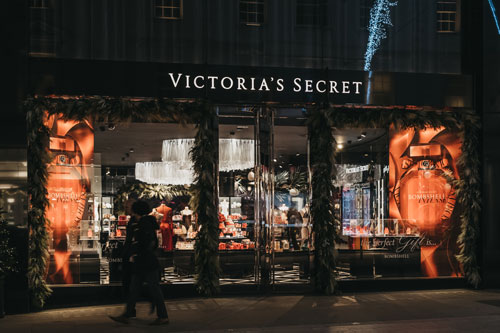 Levana Bienstock: Everyone has been affected by this no matter who you are in the world. And especially working for a global company, you realize some parts of the world are handling things in different stages at different times. You have to be very understanding and empathetic and remember that there’s people involved. The garments aren’t made by magic. There’s real people in the factories working on these things. There’s real people threading these machines. There’s real people sewing. For example, throughout the COVID process, there’s been times where different places are impacted harder at different times and people think it’s so easy to just see a new sample the next day. But I think until you actually see the work that goes into this, it’s hard to comprehend. I did take a lot of videos and a lot of pictures and to really, I think it’s about educating people so I was educating the designers.
Levana Bienstock: Everyone has been affected by this no matter who you are in the world. And especially working for a global company, you realize some parts of the world are handling things in different stages at different times. You have to be very understanding and empathetic and remember that there’s people involved. The garments aren’t made by magic. There’s real people in the factories working on these things. There’s real people threading these machines. There’s real people sewing. For example, throughout the COVID process, there’s been times where different places are impacted harder at different times and people think it’s so easy to just see a new sample the next day. But I think until you actually see the work that goes into this, it’s hard to comprehend. I did take a lot of videos and a lot of pictures and to really, I think it’s about educating people so I was educating the designers.
Levana Bienstock: I was saying, “This is so cool, but look how much work it takes to do this, this, this.” To be honest with you, we try to do a lot of upfront sketches because it’s much easier to adjust a sketch than to adjust things once they’re on the machine. And it has affected, factories are closed, things are delayed with shipping. The logistics in general are a bit slower and I don’t think it’s something that is just felt by the lingerie industry. It’s felt by every industry. And it’s affected how people buy things, affected our planning, affected how we commit to things. And it’s not something that’s going to go away overnight. It’s pushing people to think differently, go forward, and maybe a sample isn’t going to be ready as quickly as it was pre COVID. And maybe we have to think about out how many samples we’re looking at. Or maybe we have to think about how many deliveries we have. It’s sort of shifting everyone’s mindset.
Steve Cunningham: Absolutely. Going more in that direction and on a more positive note, we talked about some of the challenges, but what do you see as the biggest opportunity as we move forward in not quite a post COVID world quite yet, but where we’re at now, which is a little bit of a better place, what do you see as the best opportunity?
What do you see as the biggest opportunity for your industry right now?
 Levana Bienstock: This new digital platform, it’s really brought everyone together. It’s easier than ever to connect with a customer. We’ve seen digital be a huge, huge highlight. Amidst everything that’s gone on, people still want to shop. And that’s good for us because we have so many great things to offer and even if people can’t go to the stores we have the online digital platform. That’s huge for us. And for a lot of businesses, they’re seeing the online aspect being strong. So that’s a huge opportunity.
Levana Bienstock: This new digital platform, it’s really brought everyone together. It’s easier than ever to connect with a customer. We’ve seen digital be a huge, huge highlight. Amidst everything that’s gone on, people still want to shop. And that’s good for us because we have so many great things to offer and even if people can’t go to the stores we have the online digital platform. That’s huge for us. And for a lot of businesses, they’re seeing the online aspect being strong. So that’s a huge opportunity.
Steve Cunningham: Absolutely. And finally, what is something you could share with listeners? And maybe it’s someone early in their career like you were. I think you’ve had a really great journey and it seems like you’ve accomplished a lot and had some really great experiences. What would you say to people that are at that phase one and anything you could share in terms of encouragement or tips, and even some for your peers in the industry as well.
Levana Bienstock: Sure. It’s really important to be passionate about what you do. I’m so lucky I have a job that I really love. I love working on textiles and you have to put in the hard work. Sometimes it seems like, “Oh, it’s taking forever to get to this place.” And I’ve definitely gone on a journey to get to where I am and hopefully I have a lot more to come in my career. We all would like to think we can just snap our fingers and magically we can do anything. But learning about the process as much as you can, for everyone across the board, whether it’s design or production or even technical design partners, as long as everyone sort of is willing to learn and ask questions and trust each other, trust our partners, trust our mills and suppliers, it’s about asking questions and not being afraid to ask the questions. Because everyone has to learn somehow. And I know what I know because of asking questions.
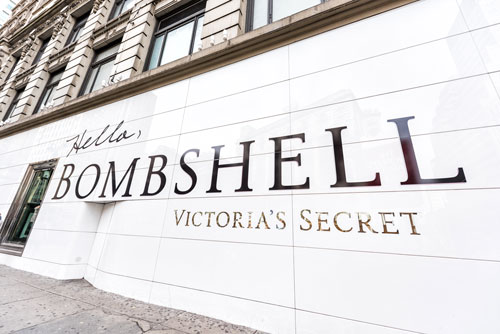 Levana Bienstock: I have to say one of my most humbling experiences is when I was in Hong Kong with the Hong Kong team. I went to visit one of our biggest lace suppliers. And I went with our lace expert. And in my head I was thinking, “Oh my gosh, I feel so bad. She has to take the day and she’s already been here. She’s going to have to do on this long journey with me and go through the factory again. And I’m sure she knows everything.” And what surprised me is when we got to this lace supplier, she sat through everything with me and she had more questions than anyone. And I realized she’s the lace expert because she’s the one always asking these questions. And even if it’s something she knew, maybe she already knew it. She was asking it because she wanted me to hear it. And it clicked that there’s no shame, no matter how much you know, to ask more.
Levana Bienstock: I have to say one of my most humbling experiences is when I was in Hong Kong with the Hong Kong team. I went to visit one of our biggest lace suppliers. And I went with our lace expert. And in my head I was thinking, “Oh my gosh, I feel so bad. She has to take the day and she’s already been here. She’s going to have to do on this long journey with me and go through the factory again. And I’m sure she knows everything.” And what surprised me is when we got to this lace supplier, she sat through everything with me and she had more questions than anyone. And I realized she’s the lace expert because she’s the one always asking these questions. And even if it’s something she knew, maybe she already knew it. She was asking it because she wanted me to hear it. And it clicked that there’s no shame, no matter how much you know, to ask more.
Levana Bienstock: And that was very valuable for me to see that even someone who has all this knowledge still wants to learn more. And just the nature of the industry with things evolving and technology getting better and better, there’s always another new thing coming out. I’m super happy where I am right now. And I think I’m lucky to work at a company where you don’t have to be the VP to say an idea. You can have an idea at any level. It’s important for people to speak up and to voice their opinions about things. And I think the other thing I would say is it’s important to find a work life balance. It’s easy, we live in a fast paced world. It’s easy to get caught up in life, to get caught up in work. And just to really find that balance and to prioritize your health and to prioritize taking care of yourself and balancing that with your work. And it will all work out if you can manage that balance.
Steve Cunningham: I agree. And it seems like there’s been an increased awareness and emphasis around mental health. Because there is a mental health side to everything that we’ve been going through so it’s nice to see that. And it’s nice to see employers embrace that and give back to their employees, whether it’s letting them stay remote if that’s what works best for them or just giving them more family time. I think those are all wonderful points and really important. I really had a great time talking with you today. Again, you’re an impressive individual and I hope we get to talk more off the mic, but I’m just really thankful for you coming on today.
Levana Bienstock: Great. I enjoyed this as well. Thanks so much, Steve.
Steve Cunningham: Thank you all for listening to Levana Bienstock, the Manager of Raw Materials at Victoria’s Secret. We hope you join us for the next installment of the Sciessent Tex Talk Podcast.
